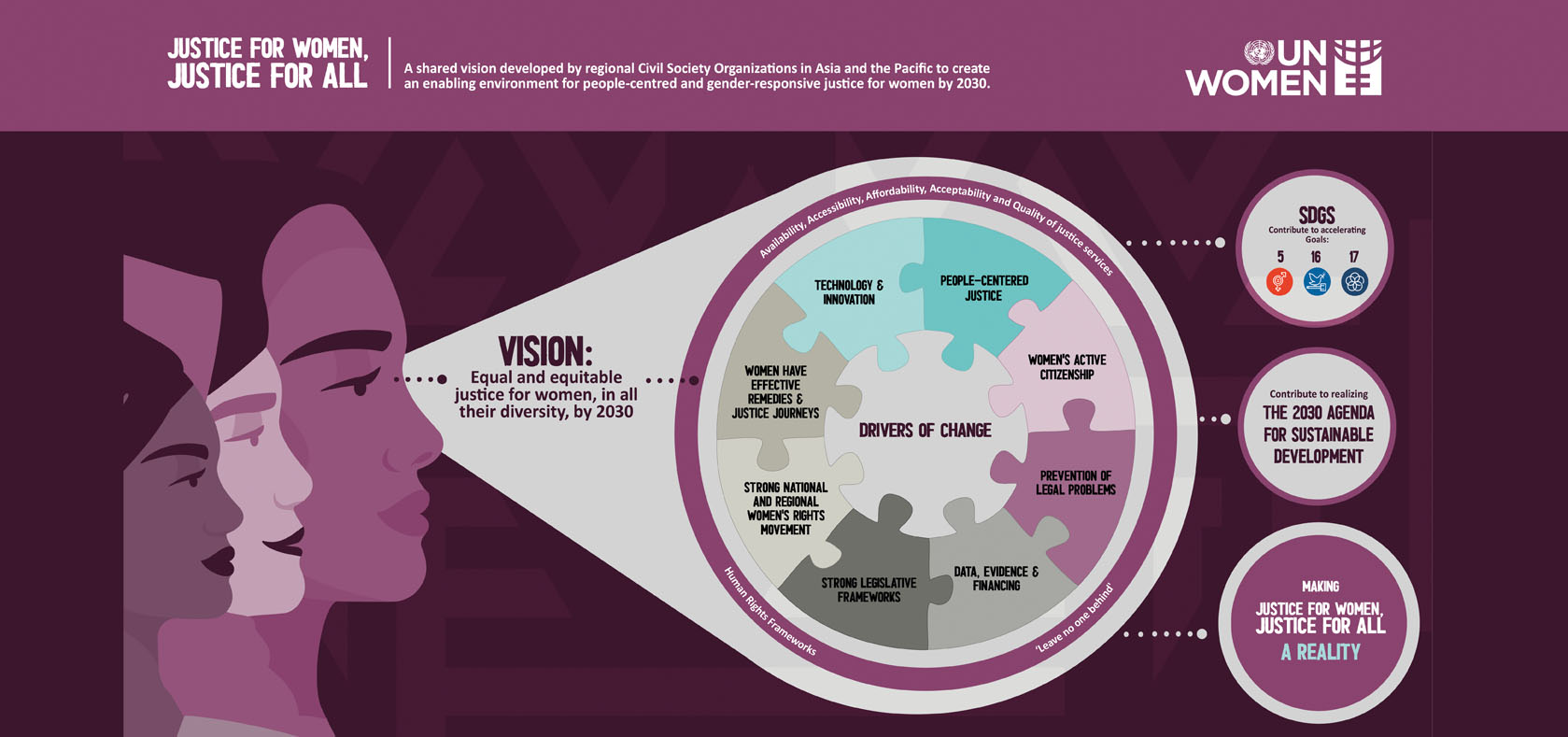Civil society organizations call for equal and equitable justice for women by 2030
Date:
Authors: Clementine Momas

Access to justice is both a right in itself and a means to protect other rights. For the majority of women in Asia and the Pacific, however, justice remains out of reach. At the current rate of progress, it could take another 286 years for women to have the same legal rights and protections as men[1].
Civil society and women human rights defenders are on the front lines of supporting women’s access to justice. Leveraging their expertise, together with the lived experiences of women seeking justice, is key to transforming justice systems to be gender-responsive and people-centred, and to leave no one behind.
UN Women is working with 25 justice organizations in Asia and the Pacific to accelerate action towards closing the justice gap for women in the region. So far, three consultations have been held, and they have collectively developed a vision for women’s access to justice, entitled Equal and equitable justice for women, in all their diversity, by 2030.
Gender justice insights
“Women worldwide expressed having experienced a diversity of justice problems. They report non-family-related issues, including consumer rights, housing, debt and public services only slightly less frequently than or to the same degree as men, even considering that women's participation in the public sphere is restricted compared to men's,” said Daniela Barba, Director of Research on Access to Justice for the World Justice Project, referring to their Global Insights on Access to Justice Survey.[2]
The majority of women continue to seek assistance outside the justice system, with only 13 per cent turning to an authority to resolve a legal issue,[3] and less than 40 per cent of women who experience violence seeking help of any kind.[4]
The negative impact of the COVID-19 pandemic on women’s access to justice has been felt across the region. “The average number of days it takes Fijian women to access justice went from 868 to 1,003 days after the pandemic,” said Shivana Singh, activist and Human Rights Training Officer for Fiji Women Rights Movement. “Austerity measures and the decreasing public spending on social services have impacted gravely the access to justice of grassroots women”, said April Porteria, Programme Officer (Feminist Development Justice) for the Asia-Pacific Forum on Women, Law and Development (APWLD).
Intersectionality is a crucial component for achieving justice for all
The specific justice needs of women facing multiple and intersecting forms of discrimination, including indigenous women, women with disabilities and women and people with diverse sexual orientation, gender identity and expression, and sex characteristics, must be considered in order to achieve justice for women and justice for all in the region.
Amba Salelkar, Capacity-Building Senior Technical Advisor for the International Disability Alliance, highlighted the justice problems faced by women with disabilities. “They are at higher risk of sexual violence and are faced with disability-based violence. Higher costs, negative economic consequences, inaccessibility of infrastructures, lack of education and exclusion are some of the key barriers women with disabilities face in gaining access to justice.”
“In Bangladesh, national laws do not ensure equality for persons of diverse sexualities, which makes it harder for LGBTIQ+ people to access justice,” said Sadia Afrin Khan, Programme Officer, Feminist Law and Practice, APWLD.
Strengthening regional collaboration to achieve justice for all women by 2030
In developing a collective regional vision for women’s access to justice, participants identified four key areas to ensure equal and equitable justice for women, in all their diversity, by 2030:
- Enhancing gender-responsive people-centred justice,
- Adopting strategies to upscale access and improve the quality of justice for women,
- Translating international women's rights frameworks into local action, and
- Strengthening multi-stakeholder partnerships to drive gender justice.
The commitment made by civil society and women human rights defenders is key to accelerating justice for women, justice for all in the region. These dialogues are held under the regional programme, entitled ‘Enhancing Access to Justice for Women in Asia and the Pacific’, jointly implemented by UN Women, the International Commission of Jurists, and the Office of the United Nations High Commissioner for Human Rights (OHCHR), with generous support from the Government of Sweden. The programme will continue to reconvene the groups in the coming months to further develop the shared vision and enhance regional cooperation.